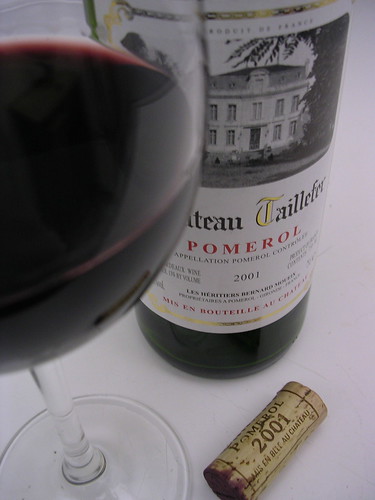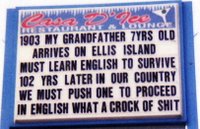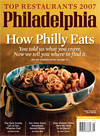Chateau Taillefer 2001 (Pomerol)

Chateau Taillefer is one of the largest producers in the Pomerol region, which is the smallest red wine region in Bordeaux. Merlot is the dominant variety in Pomerols, which generally means (1) they have a higher alcohol content; (2) they have softer tannins; and (3) although top Pomerols evolve well in the cellar, most are ready to be drunk early. Robert Parker notes that restaurants dig Pomerols specifically because they come ready-to-drink.
The PLCB boasts that Wine & Spirits gave this wine 90 points. To borrow a phrase from one of my good friends, I’d take that with a pillar of salt. Parker doesn’t have much love for this chateau. Although he lists Taillefer as a “notable” Pomerol property, he feels that, because it is one of the larger properties, it should be making better wine.
On the nose: Red berry and peppery aroma.
On the palate: The 2001 Taillefer is a blend of 75% Merlot and 25% Cabernet Franc, both of which are supposed to make this wine approachable at an early age. This wine, however, may still be too young to drink. It starts off a bit thin and watery. As it opens up, some red fruit and light raspberry finally emerge, followed by hints of spice, new oak and chocolate. The tannins could be softer and the acidity should be a little lower, but these rough edges are the privileges of youth. There’s not much of a finish. This wine shows some promise; it would be interesting to see how it matures in 3 to 5 years.
On the wallet: This wine is one of the PLCB’s Chairman’s Selections, a designation apparently meant to highlight the PLCB’s “buying power.” The PLCB claims this wine normally goes for $44.99, but thanks to the PLCB you can drive this baby home for the low, low price of $19.99. However, the $25.00 “savings” should not be the measure of whether this is a good deal; the wine needs to stand on its own at $19.99. Pomerols are supposed to come ready-to-drink, but this wine is still a bit too young. Plus, it’s not as gentle or as fruity as a Pomerol should be, which is surprising given that Cabernet Franc is in the mix. A little time may resolve these issues, but you may not have the patience to cellar something from this chateau. This is a good Bordeaux and it has potential. But $19.99 may be slightly ambitious for a wine that is not quite ready to come out of the oven.
On the table: Steak and burgers.












